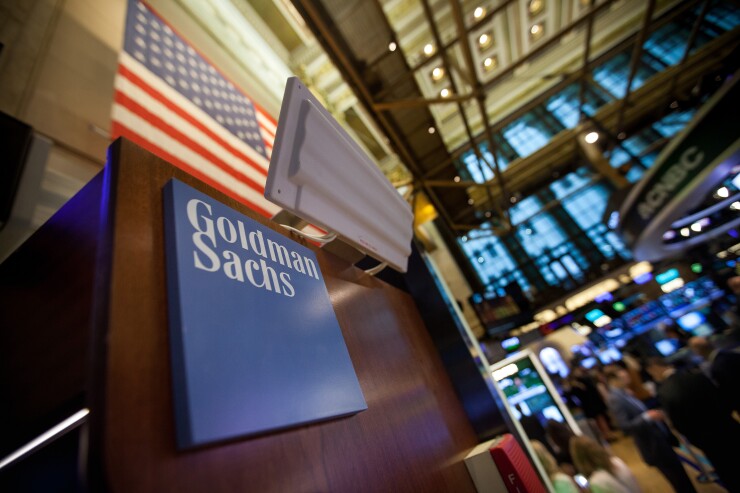Breaking News
Criminal charges
Goldman Sachs and one of its former partners were hit with criminal charges by the Malaysian government for their alleged role in the 1MDB scandal. The former banker, Tim Leissner, has already pleaded guilty to U.S. charges in the affair, which involves misappropriating funds and bribing officials. Malaysia is seeking fines over $3 billion and prison terms. Wall Street Journal, Financial Times, New York Times, Washington Post
Receiving Wide Coverage ...
The great divide
Small and regional banks are being pinched by higher deposit rates their customers are demanding at the same time the rates they are earning on loans have barely budged. "Overall, profit margins from lending are still rising at banks of all sizes," the Wall Street Journal reports. "But at many small banks, the metric has started to go in the opposite direction. Net interest margin, which is a key profit metric, fell at nearly half of a sample of small U.S. banks in the third quarter from a year earlier. It is the latest sign of a growing divide between large and small financial institutions. Big banks have spent billions of dollars developing mobile apps and other technology to attract and keep customers without paying higher rates. They also added loans to their balance sheets that benefit when rates go up."
But it’s not all smooth sailing at the big banks. “A tough fourth quarter has cast a shadow over Wall Street’s top banks, which are set to announce small rises to their bonus pools as earnings have been hit by market volatility on the back of worries about Chinese economic growth, global trade tensions, and Brexit,” the Financial Times reports. “Bonus pools at Morgan Stanley, Goldman Sachs and JPMorgan are likely to increase by low single-digit amounts. Bonuses at Citigroup are likely to be flat or down. Bank of America, which has had a tough year in investment banking, is likely to make slightly lower payouts in that division.”
Not surprising, then, that financial stocks are now officially in a bear market, down 20% from their peak last January, the result of “mounting investor concerns about the outlook for economic growth and borrowing costs. At the same time, there has also been concern about loan demand in the U.S and credit quality, particularly in the $1.3 trillion leveraged loan market,” the FT says.
That’s why hedge fund manager Stanley Druckenmiller and former Federal Reserve Board member Kevin Warsh want the Fed to ease up on their recent policy of higher interest rates and tighter monetary policy. “We believe the U.S. economy can sustain strong performance next year, but it can ill afford a major policy error, either from the Fed or the rest of the administration,” the two argue in a WSJ op-ed. “Given recent economic and market developments, the Fed should cease — for now — its double-barreled blitz of higher interest rates and tighter liquidity.” The Fed starts a two-day monetary policy meeting on Tuesday.
Financial Times
Job well done
Danièle Nouy, who is about step down as head of the Single Supervisory Mechanism, the eurozone’s chief banking regulator that was created in 2013 “to avoid another big banking crisis,” is profiled. Started with just three people — herself and two assistants — she “leaves behind an institution of 1,232 people widely credited with helping shore up a banking system that during the summer of 2012 was looking at risk of collapse.”
Washington Post
Left out
Local governments are posing a major obstacle to the growing trend toward a cashless society in the U.S. While “Americans are becoming less reliant on paper currency, mirroring shifts” in other countries, many state and local officials “see no-cash policies as discriminatory.” They “say that restaurants and shops that adopt cashless policies have left some members of the community behind — individuals without the means to open a bank account or who lack access to lines of credit or the mobile apps that power digital payments.” Some municipalities are moving to pass laws banning no-cash policies.
Quotable
No one in the finance ministry is having sleepless nights because of Deutsche Bank — not me either.” — German Finance Minister Olaf Scholz about the future of Germany’s largest bank and its possible merger with No. 2 Commerzbank.






